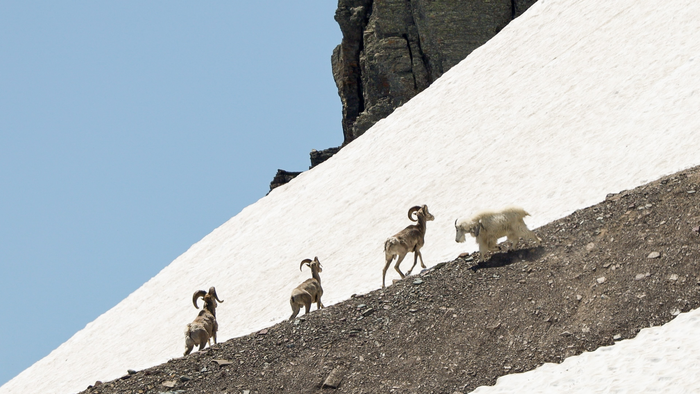A new study from the Wildlife Conservation Society (WCS), Colorado State University, and the National Park Service indicates previously unknown high altitude contests between two of America’s most sensational mammals – mountain goats and bighorn sheep – over access to minerals previously unavailable due to the past presence of glaciers which, now, are vanishing due to global warming.

Credit: Forest P. Hayes
A new study from the Wildlife Conservation Society (WCS), Colorado State University, and the National Park Service indicates previously unknown high altitude contests between two of America’s most sensational mammals – mountain goats and bighorn sheep – over access to minerals previously unavailable due to the past presence of glaciers which, now, are vanishing due to global warming.
The study also points to other coveted resources such as desert water and shade in brutal environs from Africa, Asia, and North America; species in these extreme environments contest access to these biologically important resources but such interactions have not previously been catalogued by individual species, their size, or their status as ‘native’ or ‘exotic’.
“While humans continue to be justifiably concerned about the climate-induced havoc we’re wreaking planet-wide, much has remained unknown about species aggression among our mammalian brethren” said Joel Berger, the lead author and Senior Scientist for WCS and the Barbara Cox-Anthony Chair of Wildlife Conservation at Colorado State University.
The findings from this work were distilled from fragmentary information dating backwards some four decades and included species as different as marmots and baboons, oryx and elephants, and rhinos, along with wild (i.e., feral) horses which displaced native pronghorn, mule deer, and elk from desert waters.
The study revealed that mountain goats with their saber-like horns emerged victorious over bighorn sheep in more than 98 percent of contests at three sites along a 900-mile gradient of above-treeline mountainous habitat from Colorado to Alberta, Canada. While mountain goats are a native species in northwestern North America, they are exotic in Colorado and Wyoming, including the Greater Yellowstone Ecosystem, where they were introduced. Concerns there and elsewhere have focused on the extent to which goats may displace or outcompete native bighorns. Although it remains unknown if interactions to access resources have increased over time as our climate degrades, human activity has both increased and decreased access by wildlife to restricted resources such as minerals and water through road building and by the creation of artificial water sources.
The study appears in the journal Frontiers in Ecology and Evolution. Co-authors, Mark Biel, Chief biologist at Glacier National Park in Montana, and PhD candidate Forest Hayes at CSU, pointed out that high elevation aggression between species, whether passive or active, highlight the importance of limited resources, but it’s been well known that both bighorns and mountain goats will travel up to fifteen miles or more to access these limited resources. Desert elephants travel distances even more impressive – up to 40 miles – to drink from distant waterholes in Namibia.
“It’s been exciting to gather data in wind, snow, and cold on goats and sheep in both Glacier and at Mt. Evans, Colorado, which reaches to more than 14,000 feet,” offered Forest Hayes where “our observations both at close range and from distances of more than a mile provided unique opportunities for detecting and understanding ecological interactions.”
Berger, Biel, and Hayes suggest a possible role of climate challenge through ground water depletion in desert areas but recognize humans may be a more immediate threat as water use for people increasingly jeopardizes the fragility of biodiversity in these systems. “If we can’t offer species other than ourselves a chance, we’re just cooking our fates along similarly destructive paths” offered Berger.
Associated partners and funders for this project were Colorado State University and the Wildlife Conservation Society, Glacier National Park Conservatory, Denver Zoological Society, Denver Mountain Parks, and Frederick Dulude-de Broin at LaVal University.
###
WCS (Wildlife Conservation Society)
MISSION: WCS saves wildlife and wild places worldwide through science, conservation action, education, and inspiring people to value nature. To achieve our mission, WCS, based at the Bronx Zoo, harnesses the power of its Global Conservation Program in nearly 60 nations and in all the world’s oceans and its five wildlife parks in New York City, visited by 4 million people annually. WCS combines its expertise in the field, zoos, and aquarium to achieve its conservation mission. Visit: newsroom.wcs.org Follow: @WCSNewsroom. For more information: 347-840-1242.
Journal
Frontiers in Ecology and Evolution
DOI
10.3389/fevo.2022.991714
Method of Research
Observational study
Subject of Research
Animals
Article Title
Species Conflict at Earth’s Edges – Contests, Climate, and Coveted Resources
Article Publication Date
17-Oct-2022
COI Statement
n/a




